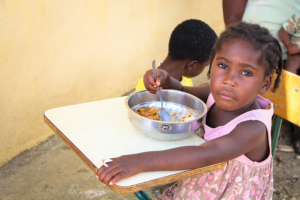The Mariposa Foundation and Poverty Reduction in the Dominican Republic
 According to suggestions, the key to poverty reduction in the Dominican Republic could be female empowerment. The country currently ranks 84th out of 146 countries in the gender gap. Like most Latin American countries, the cultural value of machismo, the concept of male superiority and dominance over women, plays a role in the island’s gender inequality. Because of this, many in the Dominican Republic expect women to remain housewives.
According to suggestions, the key to poverty reduction in the Dominican Republic could be female empowerment. The country currently ranks 84th out of 146 countries in the gender gap. Like most Latin American countries, the cultural value of machismo, the concept of male superiority and dominance over women, plays a role in the island’s gender inequality. Because of this, many in the Dominican Republic expect women to remain housewives.
Since women perform all household duties, they face limitations in their academic and economic opportunities. According to the World Economic Forum, 75% of men in the Dominican Republic participate in the labor force, while the figure for women stands at only 49%. Even though women control the affairs of the home, the expectation for men is to gain employment and provide money for the family, and this impacts female education and economic independence.
About 40% of women in the Dominican Republic carry out unpaid work at home. Due to a lack of participation in the economic sphere, the poverty rate among women is 27%, but 24% for men based on U.N. statistics.
The Impact of COVID-19
Unfortunately, COVID-19 worsened gender inequality in the Dominican Republic. During pandemic-induced school closures, females accounted for 61% of student dropouts and males accounted for just 39%. The pandemic confined female students to the household and diminished the importance of obtaining an education.
Similar to school drop-out rates, female unemployment rates as a result of the pandemic demonstrate the Dominican Republic’s levels of gender inequality. With jobs using digital technology for remote work, the number of Internet users rose throughout the Dominican Republic according to statistics from the U.N.
However, the digital gender divide restricted females from using the Internet for economic opportunities. Females are 50% less likely than men to have access to digital technology, according to the World Wide Web Foundation. Because women have minimal access to computers, they were less likely to transition to working remotely during the COVID-19 pandemic.
COVID-19 showed that the distribution of internet access is not even across the country. Although the government is working toward making the Internet universally accessible, the costs are still high. This excludes poor and rural populations from engaging in the digital world; therefore, only 59% of households in the Dominican population have internet access. Even though poverty widens the digital divide, organizations like the Mariposa Foundation commit to poverty reduction in the Dominican Republic through female empowerment.
The Mariposa Foundation
Patricia Thorndike started the Mariposa Foundation in 2009 with the goal of educating, empowering and employing young girls ages 8 to 18 in the Dominican Republic. The organization believes that investing in women educationally and culturally encourages young girls to leave their households, make an income and pull their families out of poverty. The Mariposa Foundation gives young girls access to education alongside providing the tools required to help them gain employment. The potential long-term benefit of this is that more women entering the economic sphere and bringing money back to their families could lead to poverty reduction in the Dominican Republic.
The Mariposa Center for Girls provides its students with academic enrichment and daily health and wellness activities. Before the organization opened, there was no high school in the town of Cabarete and most girls were not making it to the 8th grade. As of 2023, the school gives out scholarships and provides safe transportation to change the narrative for girls born into extreme poverty.
While the organization’s initial goal was for its students to reach the 8th grade, many have exceeded expectations; 100% of Mariposa girls are enrolled in high school. Once they graduate, the organization will continue to support them through workshops for navigating higher education, learning a trade, building a resume and starting a business.
The Mariposa Foundation also helps reduce poverty by providing economic opportunities for its students. For example, the Mariposa Foundation owns Cabarete Coffee Company, which brings in more than $100,000 in revenue to fund the organization’s programs, and Mariposa girls interested in hospitality can work for the company.
The Success Stories
One of many success stories is that of Fabiola Veraz Joazar. She works as a swim instructor and program assistant at the Center for Girls. After learning how to swim through the Mariposa Foundation, she became the first Haitian-certified lifeguard in the Dominican Republic. By encouraging girls to pursue their passions, the organization allows females born into extreme poverty to enter the economic sphere.
Not even COVID-19 slowed down the Mariposa Foundation’s efforts toward female empowerment. After announcing that the 2021 school year would be completely virtual, the organization handed out laptops and iPads to its students so all girls could continue their education. By providing the resources to close the digital gender divide, the Mariposa Foundation ensured young girls of all backgrounds could pursue their passions and be ready to enter the workforce.
What is Next?
Looking toward the future, the Mariposa Foundation is directly working toward achieving gender equality and poverty reduction in the Dominican Republic. The Mariposa Foundation provides young girls with the opportunity to expand their horizons beyond the household, find their passions and enter the economic world. With the goal of female empowerment, organizations like the Mariposa Foundation play a vital role in reducing poverty for all.
– Meilyn Farina
Photo: Flickr
